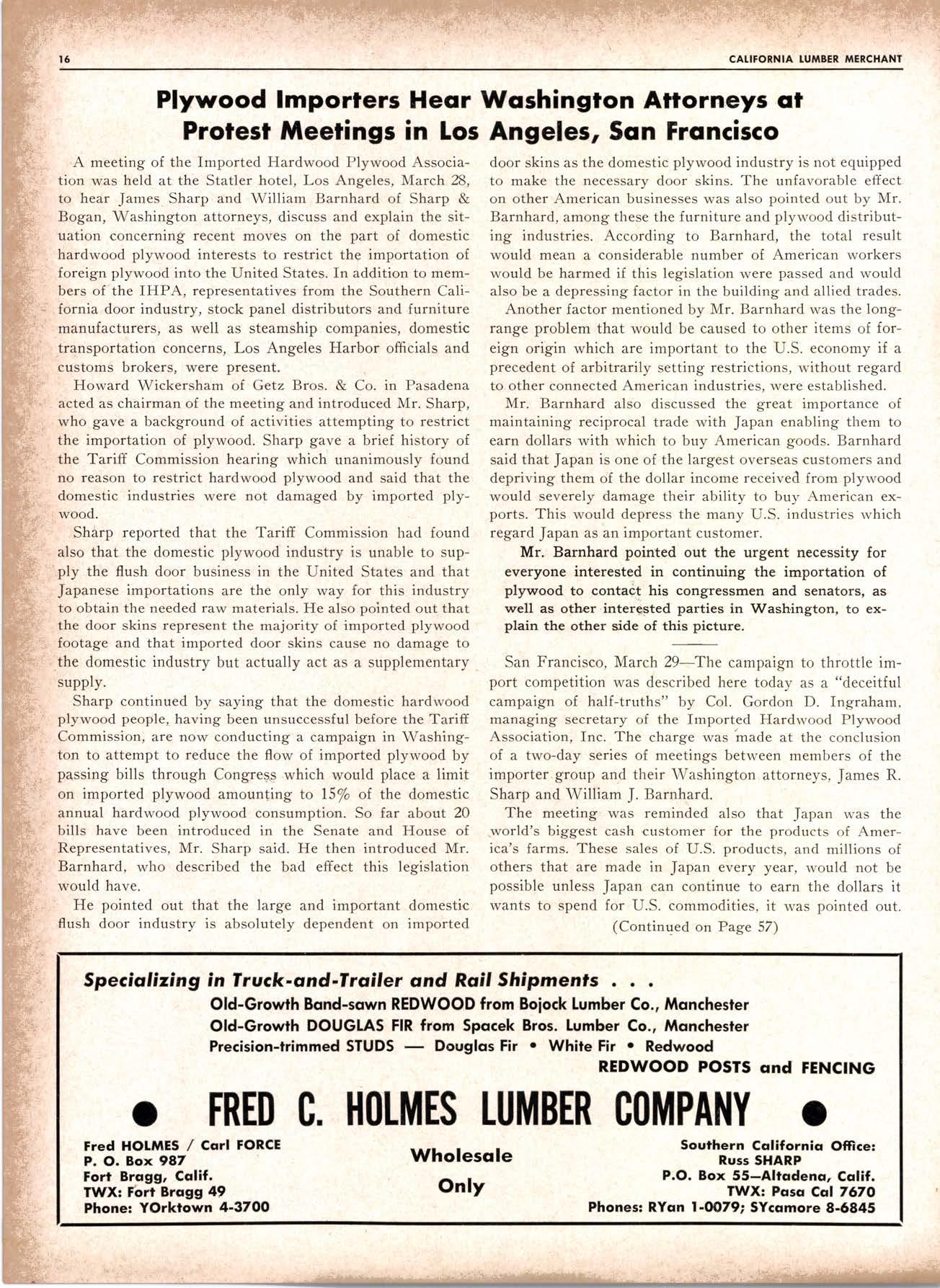
3 minute read
Plywood lmporlers Heor Woshington Attorneys ot Protest Meetings in Los Angeles, Sqn Froncisco
A meeting of the Imported Hardwood Plywood Association was held at the Statler hotel, Los Angeles, March 28, to hear James Sharp and William Barnhard of Sharp & Bogan, Washington attorneys, discuss and explain the situation concerning recent moves on the part of domestic hardwood plywood interests to restrict the importation of foreign plywood into the United States. In addition to members of the IHPA, representatives from the Southern California door industry, stock panel distributors and furniture manufacturers, as well as steamship companies, domestic transportation concerns, Los Angeles Harbor officials and customs brokers, were present.
1 Howard Wickersham of Getz Bros. & Co. in Pasadena acted as chairman of the meeting and introduced Mr. Sharp, who gave a background of activities attempting to restrict the importation of plywood. Sharp gave a brief history of the Tariff Commission hearing which unanimously found no reason to restrict hardwood plywood and said that the domestic industries were not damaged by imported plywood.
" $hdrp reported that the Tariff Commission had found ., also that the domestic plywood industry is unable to suplply the flush door business in the United States and that
,. Japanese importations are the only way for this industry to obtain the needed raw materials. He also pointed out that the door skins represent the majority of imported plywood ir' footage and that imported door skins cause no damage to domestic industry but actually act as a supplementary supply.
Sharp continued by saying that the domestic hardwood plywood people, having been unsuccessful before the Tarifi Commission, are now conducting a campaign in Washington to attempt to reduce the flow of imported plywood by ' passing bills through Congres.s .which would place a limit on imported plywood amountin g to fifo of the domestic annu?l hardwood plywood consumption. So far about 2O bills have been introduced in the Senate and House of
Representatives, Mr. Sharp said. He then introduced Mr.
Barnhard, who described the bad effect this legislation would have.
He pointed out that the large and important domestic flush door industry is absolutely dependent on imported door skins as the domestic plywood industry is not equipped to make the necessary door skins. The unfavorable effect on other American businesses was also pointed out by Mr. Barnhard, among these the furniture and plywood distributing industries. According to Barnhard, the total result would mean a considerable number of American workers would be harmed if this legislation were passed and would also be a depressing factor in the building and allied trades.
Another factor mentioned by Mr. Barnhard was the longrange problem that would be caused to other items of foreign origin which are important to the U.S. economy if. a precedent of arbitrarily setting restrictions, without regard to other connected American industries, were established.
Mr. Barnhard also discussed the great importance of maintaining reciprocal trade with Japan enabling them to earn dollars with which to buy American goods. Barnhard said that Japan is one of the largest overseas customers and depriving them of the dollar income receiveil from plywood would severely damage their ability to buy American exports. This would depress the many U.S. industries which regard Japan as an important customer.
Mr. Barnhard pointed out the urgent necessity for everyone interested in continuing the importation of plywood to contai.t his congressmen and senators, as well as other interested parties in Wash'ington, to explain the other side of this picture.
San Francisco, March 29-Jhe campaign to throttle import competition was described here today as a "deceitful campaign of half-truths" by Col. Gordon D. Ingraham, managing secretary of the Imported Hardwood Plywood Association, Inc. The charge was 'made at the conclusion of a two-day series of meetings between members of the importer group and their Washington attorneys, James R. Sharp and William J. Barnhard.
The meeting was reminded also that Japan was the .world's biggest cash ,customer for the products of America's farms. These sales of U.S. products, and millions of others that are made in Japan every year, would not be possible unless Japan can continue to earn the dollars it wants to spend for U.S. commodities, it was pointed out.
(Continged on Page 57)
Specializing in fruck-and.Trsller ond Roif Shipmenfs . .
Old-Growth Bond-sown REDWOOD from Boiock lumber Co., Monchesler
Old-Growfh DOUGTAS FIR from Spocek Bros. lumber Co., Monchester
Precision-trimmed STUDSDouglos Fir o White Fir o Redwood
REDWOOD POSTS crnd FENCTNG










